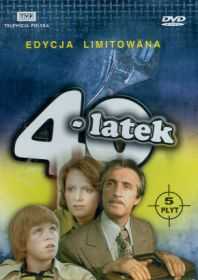Czterdziestolatek
| Czterdziestolatek | |
|---|---|
 | |
| Also known as | 40-latek |
| Genre | Comedy |
| Created by | Jerzy Gruza and Krzysztof Teodor Toeplitz |
| Directed by | Jerzy Gruza |
| Starring | Andrzej Kopiczyński, Anna Seniuk, Irena Kwiatkowska |
| Country of origin | Poland |
| Original language(s) | Polish |
| No. of seasons | 2 |
| No. of episodes | 21 |
| Production | |
| Running time | 50 minutes |
| Production company(s) | Telewizja Polska (TVP) |
Czterdziestolatek or 40-latek (English: The Forty-year-old; transmitted by TVP Polonia as English: Being Forty) was a Polish television comedy series broadcast between 1974 and 1977. The first series enjoyed so much popularity that it continued and led to the release of a feature film I'm a Butterfly, a 40-year-old Love Affair and a New Year's Eve television program in 1975.
The series was written by Jerzy Gruza and Krzysztof Teodor Toeplitz and was broadcast on Telewizja Polska. In total, 21 episodes were produced.[1]
The series followed the fate of a Warsaw family and explored topics related to midlife crisis, such as extra-marital affairs, attempts to quit smoking, obsession with hair loss, efforts to maintain physical fitness, pride in achievements and professional life, the desire to seek self-fulfillment through social activities, etc.
20 years later the series was remade in the mid-1990s with a cast that included Joanna Kurowska, Wojciech Mann and Wojciech Malajkat.
Episodes
- The toast, or closer than further (Toast czyli bliżej niż dalej)
- Struggle with addiction, or maze (Walka z nałogiem czyli labirynt)
- Come by whenever you'd like, or dulled stimuli (Wpadnij kiedy zechcesz czyli bodźce stępione)
- The portrait, or how to be loved (Portret czyli jak być kochanym)
- Physical fitness, or the fight against the birth certificate (Kondycja fizyczna czyli walka z metryką)
- Flora's hair, or the maze (Włosy Flory czyli labirynt)
- Judym or a social action (Judym czyli czyn społeczny)
- Opening of the route, or free time (Otwarcie trasy czyli czas wolny)
- Family, or strangers at home (Rodzina czyli obcy w domu)
- Postcard from Spitsbergen, or enchantment (Pocztówka ze Spitzbergenu czyli oczarowanie)
- Somebody else's misery, or defense witness (Cudze nieszczęście czyli świadek obrony)
- New deputy, or the meteor (Nowy zastępca czyli meteor)
- The scapegoat, or the rotation (Kozioł ofiarny czyli rotacja)
- Małkiewicz case or kamikaze (Sprawa Małkiewicza czyli kamikadze)
- Expensive gift or revisit (Kosztowny drobiazg czyli rewizyta)
- Where have you been or Shakespeare (Gdzie byłaś czyli Szekspir)
- A cunning beast, or the cristal (Cwana bestia czyli kryształ)
- War game or on the billet (Gra wojenna czyli na kwaterze)
- Away from people, or something of your own (Z dala od ludzi czyli coś swojego)
- In self-defense, or the hunt (W obronie własnej czyli polowanie)
- Shadow's streak, or the first serious warning (Smuga cienia czyli pierwsze poważne ostrzeżenie)
Original cast
|
|
|
References
- ↑ Haltof, M. (2002). Polish National Cinema. Berghahn Books. p. 148. ISBN 978-1-57181-275-9.